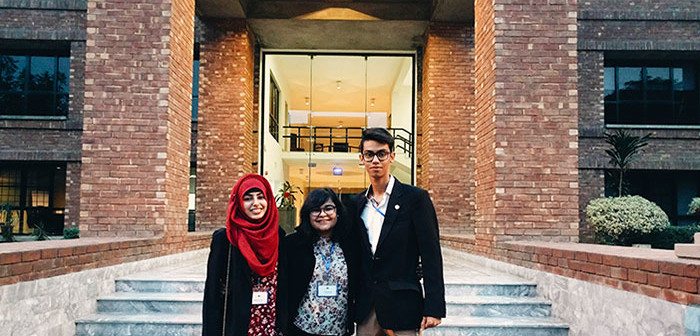Lahore, April 2016: The women of South Asia have a particularly abusive relationship with the state and its institutions. Gender violence in the region is relentless and the support for women who’ve faced it is minimal. Last summer, Habib University students worked on Zariya India – a service that gives these women access to relevant authorities for legal and counselling help. The students also helped set up the service to collect statistics, and model social problems into computational ones. This year, they presented their research findings at the Lahore University of Management Sciences (LUMS) at Lahore, taking apart gender violence, and the legal system put in place to counter it.
The students, Anusha Fatima, Fatin Nawaz and Hasan Naqvi, aimed to continue work on gender violence in a more local context, thus started to work on Project Dareecha. Their research is on how working women proceed when they are affected by gender violence; do they understand the legal rights they have? Do they report their cases to Human Resources? Do they take it forward if HR is unsupportive?
As per the students, “Our intuition is that working women, particularly in Karachi, are not aware of their legal rights and this is because the legal information is too dense and not delivered through the right medium. We believe it needs to be presented in layperson’s terms with multilingual translations for readability”.
To strengthen their foundations, the students are studying laws with the direct consultation of lawyers and activists who helped create these laws. Their service will provide visual, interactive, and multilingual infographics that will not only represent the legality of working womens’ rights but also give statistical representation of workplace gender violence so women know they are not alone in facing abuse.

These infographics will inform working women about actions that can be taken if they find themselves in an abusive situation, the key aspects of the previous successful cases, and a step by step guide on how to take the case to the higher authorities. Our service will empower working women to raise their voice against injustice by making them more conscious about the problem itself and the solutions available.
Saida Waheed Gender Initiative: Inaugural Student Colloquium
HU students Anusha Fatima, Hasan Naqvi and Fatin Nawaz had applied to the colloquium and were selected to present their Project Dareecha, with the event being held over a period of over two days. The second day of the event was dedicated to student presentations and talks, and covered subject areas such as: Gender in the city, Gender and Literary Representations, Gender and Legal Imaginations, Locating Psychology in the Study of Gender, Gender and the Sacred, Gender, Labor and the Household, Representing Gender Worlds, and Gender Violence and Policy. The HU students in particular spoke on the last panel where the faculty discussant was Dr.Tania Saeed who is an assistant professor in AHSS LUMS.
The students received healthy and productive feedback on their talk and project, with an audience made up of different backgrounds including law, activism, and gender, acknowledging their work and providing them with valuable advice. Their project was also appreciated by a family member of the Saida Waheed family itself (who have played a major role in the development of this Gender initiative). The students’ project was showcased to the students, faculty, and guests at LUMS, giving them an excellent opportunity to network with various professionals working within this field.




